The Chocolate King and the Gas Princess
In the midst of unrest in Eastern Ukraine and the threat of a new Russian intervention, the transitional government in Kiev is preparing for the election of a new president on May 25.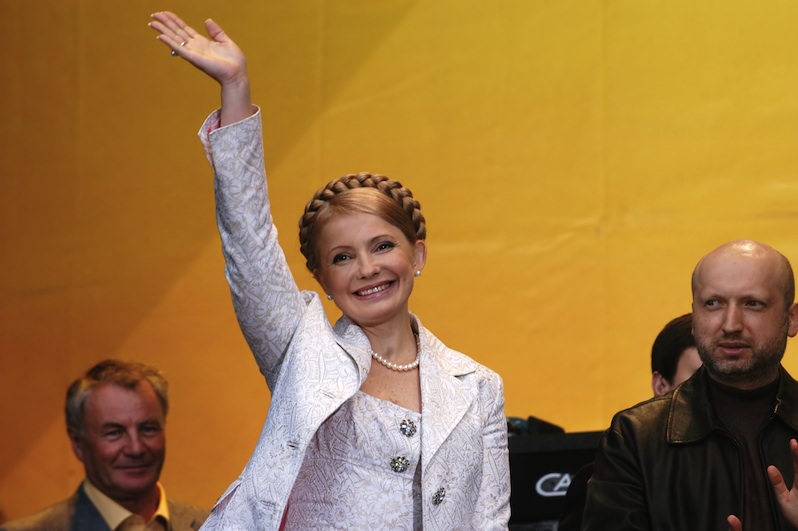 Runner-up: Yulia Tymoshenko, pictured here in 2007, trails Petro Poroshenko in the polls. Shutterstock
Runner-up: Yulia Tymoshenko, pictured here in 2007, trails Petro Poroshenko in the polls. Shutterstock
In the midst of unrest in Eastern Ukraine and the threat of a new Russian intervention, the transitional government in Kiev is preparing for the election of a new president on May 25. Although the country’s future remains shrouded in mist, the fog is at least lifting over the field of contestants. As a result of the revolution on Kiev’s Maidan Square, the Ukrainian parliament toppled President Viktor Yanukovych in a controversial decision. The revolution did not, however, remove the old elites. Instead, the majority of Ukrainian deputies simply abandoned Yanukovych when his position became untenable after the death of 76 people, mostly demonstrators, on Feb. 18-20. The struggle for quick stabilization in the face of Russian intervention led to even stronger reliance on established political figures. Not surprisingly, there are many familiar faces among the presidential hopefuls.
A total of 24 candidates submitted their applications to Ukraine’s central electoral body in late March. They represent pro-Western, leftist, liberal, nationalist, pro-Russian and even fascist positions, but only a handful can expect to stand a chance. Although the details of their popular support remain rather spotty, a recent poll by four Ukrainian research institutions has shed at least some light on the question.
The survey, conducted among 6,200 voters across the country, found that 84 percent of them intend to go to their polling place. Of this electorate, one-fifth is as of yet undecided for whom they will vote. One of the key findings is that extremist parties enjoy only marginal support. Candidates of the two neo-fascist parties, Right Sector and Svoboda, who have done much to discredit the revolution in Maidan in the eyes of the Russian and Western audience, poll at less than 2 percent.
The clear leader is Ukrainian businessman and “chocolate king” Petro Poroshenko, with the support of 25 percent of those surveyed. Since the poll was conducted at the end of March, Poroshenko has consolidated his position. Maidan protest leader and heavyweight boxing champion Vitali Klitschko withdrew his own presidential ambitions to endorse Poroshenko. Klitschko, head of the new political formation UDAR, which means both “strike” and Ukrainian Democratic Alliance for Reform in Ukrainian, enjoys significant popularity among the progressive urban electorate hoping for sweeping change in Ukrainian politics. He thus came in second place in the poll, immediately behind Poroshenko.
Klitschko, whom many observers and most famously U.S. Assistant Secretary of State Victoria Nuland (in a leaked phone conversation) consider politically inexperienced, is rumored to have made a deal with Poroshenko for the post of Kiev mayor, should he become president. Moreover, the duo enjoys the support of Western donors, most prominently British Prime Minister David Cameron, and one of the most powerful Ukrainian oligarchs, Dmytro Firtash. Firtash fled to Vienna after the Ukrainian revolution because of his close ties to both Russian politicians and Yanukovych. Currently released on a 125 million euro ($173 million) bail after his arrest on corruption charges, Firtash appears to be attempting to reconsolidate his political influence.
Poroshenko is himself one of Ukraine’s richest men. His personal fortune is estimated at $1.6 billion. He owns the candy brand Roshen, which is extremely popular in the post-Soviet space. He was one of the first Ukrainian oligarchs to support the protests on Maidan publicly and financially and draws much of his current popularity from taking an unsuccessful but courageous stand against a mob of pro-Russian protesters in the Crimean city of Simferopol shortly before the peninsula’s annexation.
Poroshenko runs on a pro-Western, pro-reform platform, promising to lead Ukraine into the European Union and implement the painful reforms — an increase in subsidized gas prices and an end to state support for unprofitable businesses — that Western donors demanded as a condition for their $27 billion aid package in March. Poroshenko also promised to resolutely oppose any Russian attempts to annex other parts of the country, saying, “If the aggression continues against the rest of the country, the Ukrainian army will open fire.”
Moscow has already enacted political sanctions against entrepreneur Poroshenko, who does 40 percent of his business in Russia. Claiming that his chocolate does not conform to Russian sanitary standards, officials closed two of his factories. Poroshenko’s connections to Russia remain nonetheless close, as his daughter-in-law is Russian. He was also one of the founders of Yanukovych’s Party of Regions and a minister in the governments of both Viktors — Yushchenko and Yanukovych. Poroshenko is thus clearly an “insider,” but also a politician who has managed to remain surprisingly popular in spite of his many volte-faces. As president, he is likely to continue the precarious balancing act between Russia and the European Union that his predecessors engaged in as well.
Yulia Tymoshenko, the current runner-up, polling at 8.2 percent, is also a familiar face. The figurehead of Ukraine’s 2004 “Orange Revolution” was recently released after she spent more than two years in prison. She is also running on an anti-Russian platform, famously stating her intention to “shoot Putin in the head” after the Russian annexation of Crimea. She presents herself as an advocate of Ukraine’s urban middle class and prisoners’ rights, a fighter for reforms and an opponent of corruption. However, she also has a credibility issue: During the 1990s, Tymoshenko was one of Ukraine’s richest and most powerful people, earning her the epithet “gas princess.” She continued to conclude opaque deals with Russia over gas deliveries during her time as prime minister. The constant political infighting that accompanied her and Yushchenko’s reign did much to contribute to Yanukovych’s re-emergence after he lost the presidential elections to Yushchenko — and to the delegitimization of democratic and pro-Western ideas in Ukraine. Moreover, although the trial against Tymoshenko was certainly politically motivated, few doubt that she was involved in corruption — like virtually all other members of post-Soviet political elites.
Tymoshenko’s reception on the Maidan after her release from prison was less enthusiastic than she had hoped for. She should nonetheless not be discounted. Her party, Batkyvshchina (Fatherland), is the only pro-Western party with a nationwide network and a broad base from which to recruit political cadres. Ukraine’s current prime minister, Arseniy Yatsenyuk, is one of the party’s leaders, and it also controls most central positions in the current government. Other candidates, including Poroshenko, do not have this kind of infrastructure to rely on. Moreover, Tymoshenko, unlike Poroshenko, is a gifted orator. Ivan Lozowy, a policy analyst in Kiev, sees Tymoshenko as Poroshenko’s main problem: “God forbid if there are debates — she is simply going to overwhelm Poroshenko,” he told Radio Free Europe.
The only other nationwide party, Yanukovych’s Party of Regions, is currently struggling to recover from the blow dealt to it by the revolution. Yanukovych’s closeness to the Russian government, his corruption and his escape have ruled him out as a potential candidate and affected his party’s credibility. Opposition to Russia has become one of the cornerstones of any candidacy in these elections — because of the annexation of Crimea and to a greater extent the recent clashes in the Eastern Ukrainian cities of Slavyansk, Kharkiv and Donetsk. Russian political scientist Pavel Svyatenkov emphasized, “All candidates will have to present themselves as anti-Russian to a lesser or greater degree.” Andreas Umland, a German political scientist working at Kiev’s Mohyla Academy, told me that “Putin’s actions contributed considerably to Ukraine’s political nation building.”
Russia’s invasion has certainly weakened both pro-Russian forces and politicians from Eastern Ukraine, many of whom are seen as Russian stooges in Kiev and Western Ukraine. As a result, promising candidates like Sergey Tigipko, who came in third in the 2010 elections, prefer to run as independents. The official Party of Regions candidate is Mikhail Dobkin, the popular former governor of the eastern Kharkiv province, whose national poll numbers are in the single digits. The new Ukrainian government indicted him for organizing illegal separatist demonstrations. Although it is true that Dobkin authorized a violent crackdown against pro-Western demonstrators in Kharkiv and enjoys close ties to Russia, many commentators doubt that he is in fact a separatist. His political demands include greater autonomy for the provinces and opposition to the Association Treaty with the European Union. He has, however, repeatedly called a possible integration of Ukrainian territories into Russia “a disaster.”
Dobkin, like many in the east, uses primarily economic arguments to support his opposition to Ukrainian integration into European markets. Companies in Eastern Ukraine produce primarily for the Russian market, and he fears that the loss of this market would lead to massive layoffs in his province — “between 30 and 50 percent of all jobs,” Dobkin said. Although European markets promise potential for Ukraine’s economy in the long run, the short term consequences, particularly in the east with its many outdated factories, are most likely to be primarily negative. On the other hand, many oligarchs in the east of Ukraine, first and foremost Dobkin’s backer Rinat Akhmetov, fear being forced out by Russian businessmen in the event of a Russian takeover.
For Ukrainians in the country’s eastern regions, the current situation is indeed difficult — not least because of the Russian invasion. It is unlikely that a candidate with a political base in Eastern Ukraine will win the elections. The eastern and southern regions have become less important because of the annexation of Crimea; Crimeans made up approximately 5 percent of the Ukrainian electorate, and the peninsula voted overwhelmingly for Yanukovych. Without Crimea, the western and central regions decide who will become president. As a result, many of the legitimate grievances there — first and foremost the call for more autonomy in the distribution of funds and the elevation of the Russian language’s status in the country — will largely be ignored in the best case and attributed as Russian “divide and conquer” tactics in the worst. The fact that Russian Foreign Minister Sergei Lavrov is championing the cause of federalization of Ukraine — in principle, a widespread demand in various regions of the country — is certainly not helping.
Even if one assumes that Russia will not annex further regions in eastern and southern Ukraine, and the presidential elections can be held in Ukraine’s current territory, the country’s eastern citizens face a difficult future. A vast majority of eastern Ukrainians — more than two-thirds according to a recent poll — support the overthrow of Yanukovych, and only 24 percent of them see Russia’s annexation of Crimea as justified. Nonetheless, the presidential elections — because of western Ukrainian indifference and Russian meddling — will most likely leave them without a clear voice in Kiev.
The transitional government in Kiev, under pressure from Russia and from armed, possibly Russian-backed separatists in Eastern Ukraine, seems to have realized this at last. Yatsenyuk traveled to Donetsk on April 11 to meet with regional leaders, indicating support for an extension of local and regional autonomy. Ukrainian interim President Oleksandr Turchynov also addressed the possibility of holding a referendum on Ukraine’s state structure simultaneously with the elections on May 25. At this point, however, both the threat of armed clashes between the Ukrainian army and separatists and of a renewed Russian invasion makes it very much unclear whether these elections and votes can even be held at the end of May.
Your support matters…Independent journalism is under threat and overshadowed by heavily funded mainstream media.
You can help level the playing field. Become a member.
Your tax-deductible contribution keeps us digging beneath the headlines to give you thought-provoking, investigative reporting and analysis that unearths what's really happening- without compromise.
Give today to support our courageous, independent journalists.
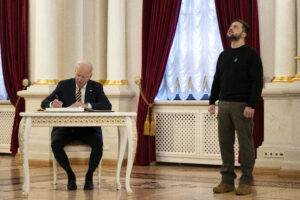
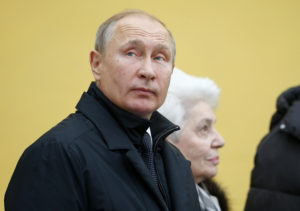
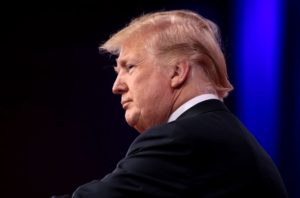
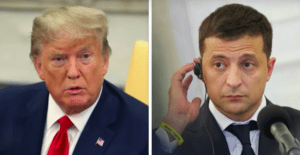
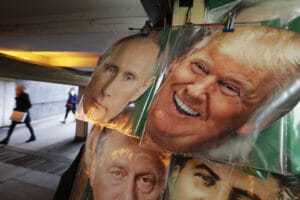
You need to be a supporter to comment.
There are currently no responses to this article.
Be the first to respond.